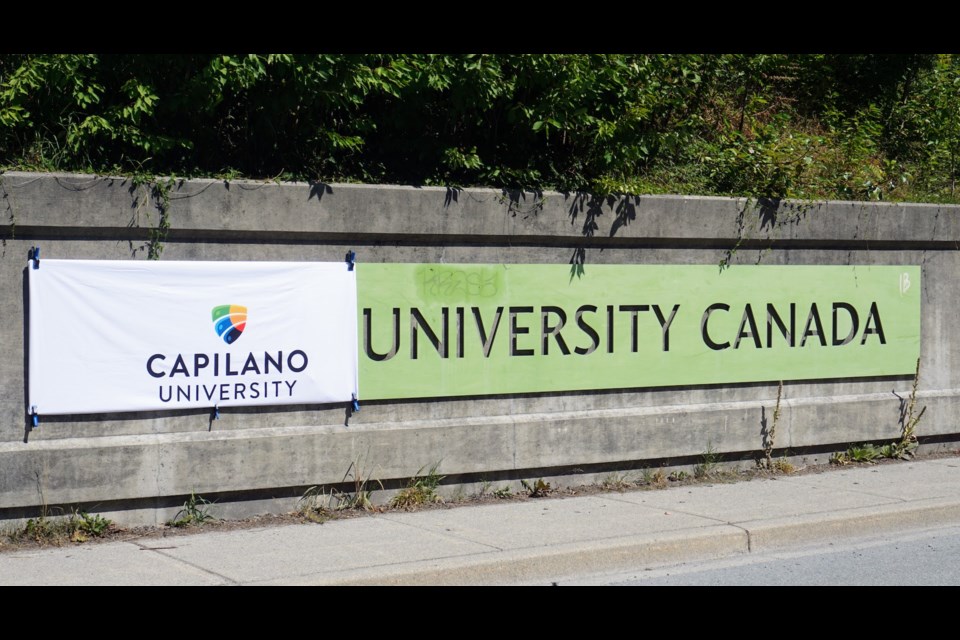Capilano University announced on Wednesday, Aug. 16 that the public post-secondary institution purchased Quest University for $63 million. The B.C. government is supplying about $48 million of that total.
With a new educational addition, what does that mean for Squamish?
Educational programming
At the outset, the university plans for about 100 students to be on campus in the spring of 2024, and up to 380 students in later years. The Minister of Post-Secondary Education and Future Skills, Selina Robinson, said the first courses will focus on “early childhood care and education and literacy programming.”
As for fall 2024 enrolment, Robinson said they hope to add “art, science, business programs, as well as outdoor recreation and programming with the Squamish and the Lil’wat Nations.”
“I'm most thrilled for the people who call this region home because it means that you will have access in your own backyard to an education opportunity right here on this campus,” she continued.
Robinson said former Quest students were welcome to take courses at Capilano University or other post-secondary institutions.
Also announced, Capilano University will no longer be purchasing the two-acre property from Oceanfront Squamish, as the school’s news release said the term of their agreement expired in the spring. Oceanfront Squamish wrote to The Squamish Chief and the company said it extends a "warm welcome" to Capilano.
"While we had hoped to welcome Capilano University on the Oceanfront Squamish site, we understand and appreciate the significant value brought to the community by having a post-secondary institution in town,” said the president of Matthews West, John Matthews, which owns Squamish Oceanfront.
The company said it looks forward "to continuing the strong relationship built with Capilano University over the years."
Moreover, Mayor Armand Hurford said he was not too concerned about the change in location, and the “biggest piece” for him was having post-secondary education in Squamish.
“Engaged students become engaged citizens, who contribute to our local workforce, volunteerism, arts, culture and public engagement,” he told the crowd at the conference.
Student housing
Capilano University has not secured student housing at the Squamish campus as yet, although it is exploring its options.
“Having a campus here means that people can stay in their current existing housing and go to school,” said Robinson. “We recognize that housing is really challenging right across the province and so that's why Capilano University is exploring housing options and we're in ongoing discussions about how to address additional housing needs that the university might need.”
A B.C. government news release notes there is a potential opportunity to acquire the already-built student housing, which could house roughly 450 students, but said further “feasibility analysis” is required.
“I do think that housing is a key issue for our community,” Hurford told The Squamish Chief after the announcement. “I know that that's something that they're working on and hope to have resolved by the time they're up and running.”
Hurford added that there would be a certain percentage of students who are from Squamish.
“And that is one of the best parts of all this,” he continued.
Robinson says government did ‘due diligence’ before purchase
An open letter was sent to Robinson and Premier David Eby from the founder of the Save Quest campaign and Quest alumni, Jake Henderson, before the official announcement of the acquisition.
In the letter, Henderson said the infrastructure available on the campus supported Quest’s teaching philosophies.
“There are no lecture halls, and the classrooms can only hold 20 students. The faculty offices were designed specifically to foster an interdisciplinary approach and force professors of all disciplines to work side by side, share ideas, and expand their perspectives,” he wrote.
The B.C. government release confirmed that some “minor renovations will include upgrading some classrooms for the university’s specific programming needs.”
Henderson suggested that Capilano could lease the lands back to Quest at a “reasonable rate,” with the benefit of the funds going to Capilano.
“You could offer the Quest curriculum through Capilano University. There is a public benefit that arises if this curriculum becomes accessible via the public system,” he continued.
Ultimately, Henderson asked for “more time, an opportunity for consultation, and a good faith consideration of Quest’s future before any public commitment is made.”
Additionally, researcher Vivian Krause also wrote to Eby asking him to wait on the announcement, citing a complaint she made to the RCMP about Quest as well as audits from Canada Revenue Agency that revealed “gross malfeasance” after parts of the property were transferred to charitable foundations set up by Vancouver charity law specialist Blake Bromley.
Robinson was asked about these matters at the news conference and replied that the government “always does due diligence in any purchase.”
Robinson said it made good sense that when the opportunity arose where Capilano could purchase existing buildings and offer post-secondary education to the Squamish community.
“That's why government made the decision to support the students, the learners, the potential learners here in the corridor, so they no longer have to commute into Vancouver to get their education.”
Andrew Hamilton, speaking as former Quest University faculty, said he thought about the Quest closure in April separately from the Capilano announcement and welcomed an option for post-secondary education in Squamish.
“The Quest educational model, I think it was amazing. I sincerely hope that Quest University and that model can continue elsewhere,” he said. “But when we look at this community, this community does need to move forward with some educational institution on this land.”
“This relationship with Capilano is an amazing opportunity for a university, for post-secondary education, to continue in Squamish,” he continued. “If I think about this from a community perspective, this is a really positive deal.”
~with files from Bob Mackin/BIV
Note: this piece has been updated to reflect comments from Matthews West/Oceanfront Squamish



